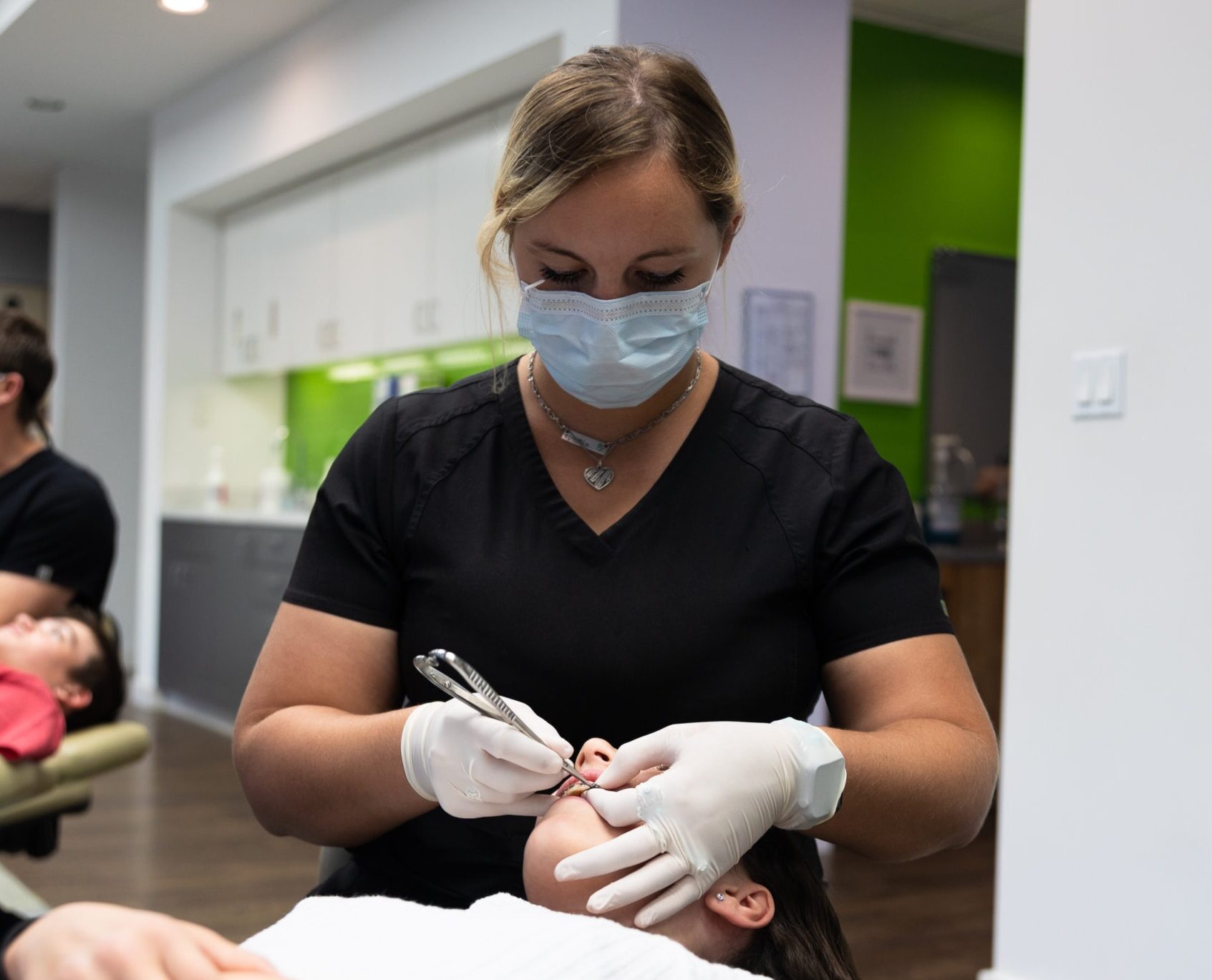So, you’ve finally got braces—and you look great! But it can mean a lot of big lifestyle changes, especially right out of the gate. Lucky for you, our stellar team at Hunter Family Orthodontics can provide you with a foolproof guide to your first week in braces!
The Triple Threat
In terms of braces and clear aligners, you can expect to get one of the following if you work with Dr. Hunter:
- We’re proud to offer Invisalign in our office! This popular appliance has some different steps in the initial adjustment process.
- Clear braces (aka ceramic braces) are able to match the color of your teeth and are just as effective as metal braces.
- Metal braces are the most classic choice and often the most common for pediatric patients.
Your First Week in Traditional Braces
Let’s begin by giving you an idea of how your first week in traditional braces will go. And remember—our team is only a call away at 281-306-5947 if you’re having any persistent problems.
- Oral Hygiene: Practicing oral hygiene is a big part of having braces! Food can get trapped in wires and brackets, and developing plaque can lead to tooth decay. Carry a kit with you to ensure you’re brushing after every meal and flossing regularly. There might be some tenderness during your first seven days, so be gentle with your routine.
- Discomfort: First of all, your mouth is not as empty as it used to be. That can be a bit jarring in itself. But soreness can also happen when your teeth first start adjusting, though this shouldn’t last beyond a few days. This is best managed with over-the-counter pain meds. Take them as instructed by Dr. Ross.
- Ulcers or Sores: You have a lot of soft tissues in your mouth that can be irritated by parts of your braces. Orthodontic wax is the best way to dull sharp edges.
- Dietary Changes: Watching what you eat is also a key component of caring for your braces. Soft foods like yogurt, mashed potatoes, and smoothies are the smartest options for you starting out to avoid any initial damage.
- Speech Changes: You might find you talk a bit differently at the beginning of treatment. This is because your tongue has to adjust. Practicing speaking and reading out loud can help you adapt.
If you’re a parent, there might be a few extra ways you can help your child through their first days in braces. We treat patients of all ages, so we can answer any and all questions you might have along the way!
- Encourage Patience: Children generally have less patience in these situations! It’s always helpful to remind them that the discomfort they’re feeling is not permanent.
- Positive Reinforcement: We highly recommend offering praise for your child’s commitment to their new orthodontic treatment! Remind them that all of their hard work will be worth it in the end.
Your First Week in Invisalign
There are some commonalities between the first week in traditional braces and Invisalign—but for the most part, it’s a different process because it’s a very different appliance.
- Initial Discomfort: Pressure on your teeth when they start to shift is usually the culprit here. The good news is it’s usually mild and less painful than uncomfortable.
- Regular Wear: When you don’t have a fixed appliance like traditional braces, It’s critical that you keep your aligners on for at least 20-22 hours per day. Eating, drinking, and cleaning should be the only times you remove them on a daily basis. This can take some getting used to and takes a good deal of self-control.
- Hygiene: Flossing and brushing shouldn’t be hard with a removable appliance. You’ll also need to clean your aligners to prevent staining and unpleasant odors. Staining is typically a consequence of drinking beverages like coffee or tea with your aligner on.
- Speech Adjustments: One of the benefits of Invisalign is its custom fit, but it can impact your speech! You might experience a temporary lisp and issues pronouncing certain words and sounds. Practice will be the best solution!
- Diet: You don’t have to avoid any foods while using Invisalign (though sugar is still not always a great option!). However, you still need to be committed to brushing your teeth after eating. Remnants of food can get sealed to your teeth within your aligners if you don’t.
Onwards and Upwards!
The thing about orthodontic treatment is that getting your appliance is just the tip of the iceberg. You’ll continue to partner with us throughout your journey, and that means we’re happy to help you with the initial transition so you can start off strong. We would love to see you in our Woodlands office, so book your free consultation now!

